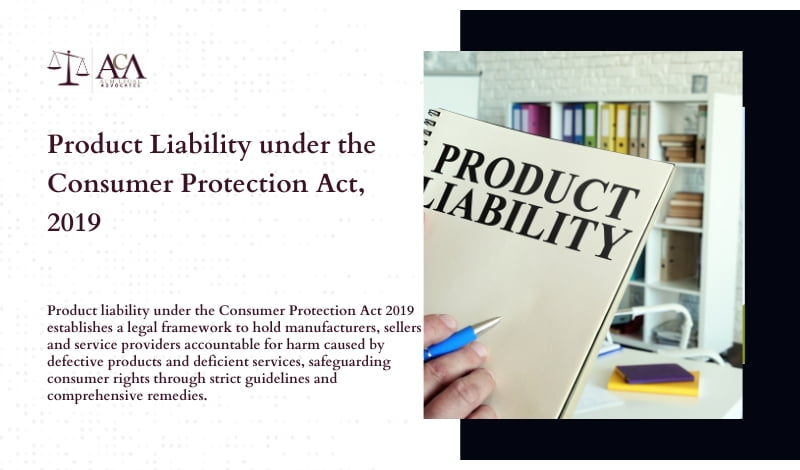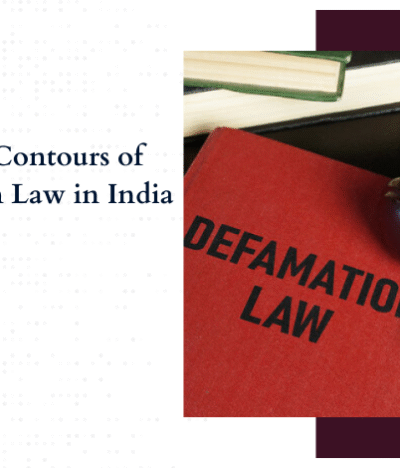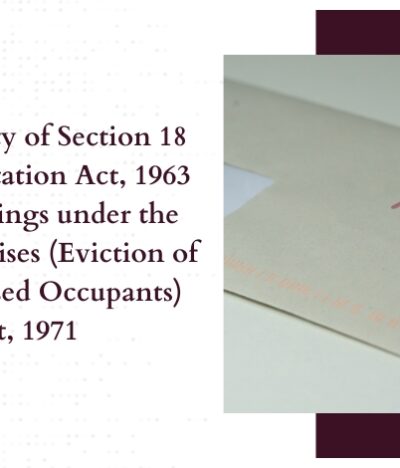What is product liability according to the Consumer Protection Act 2019? Product liability under the Consumer Protection Act 2019 refers to the responsibility of a product manufacturer, seller or service provider for any harm caused to a consumer by a defective product. According to Section 2(34) of the Act, “Product liability means the responsibility of a product manufacturer or product seller, of any product or service, to compensate for any harm caused to a consumer by such defective product manufactured or sold or by deficiency in services relating thereto.”
The Consumer Protection Act 2019 aims to safeguard consumer rights by establishing strict guidelines for product liability. This legislation enforces accountability and ensures that consumers receive fair compensation for damages caused by defective products or deficient services. By encompassing a broad range of responsibilities for manufacturers, sellers and service providers, the Act significantly strengthens consumer protection mechanisms, promoting higher standards of quality and safety in the marketplace.
Table of Contents
TogglePurpose of Product Liability in the Act
The purpose of product liability under the Consumer Protection Act 2019 is to ensure that consumers are protected from harm caused by defective products and deficient services. By holding manufacturers, sellers, and service providers accountable, the Act aims to create a safer marketplace where consumer rights are prioritized.
The Act, further empowers consumers to file complaints and seek compensation for any harm caused by defective products or services. This legal framework not only facilitates the resolution of disputes but also promotes consumer confidence in the market.
Key Aspects of Product Liability
Product liability under the Consumer Protection Act 2019 encompasses several key aspects that collectively ensure comprehensive consumer protection.
Definition and Scope
According to section 2(34) of the CPA 2019, product liability refers to the legal responsibility of a product manufacturer, service provider or seller to compensate consumers for any harm caused by a defective product or deficient service.
Under CPA 2019, product liability encompasses a wide range of scenarios where harm is incurred due to faulty products or inadequate services.
Manufacturer, Service Provider and Seller Liability
Liability of Product Manufacturer
When it comes to product defects, manufacturers bear significant responsibility. They can be held liable if their product has:
- A manufacturing defect
- Design flaws
- Deviation from specified manufacturing standards
- Failure to meet express warranty commitments
- Lack of adequate instructions or warnings for safe usage
Liability of Product Service Provider
Service providers are not exempt from accountability. They can be held liable if they provide services that are:
- Faulty, deficient or inadequate in quality
- Negligently performed, resulting in harm
- Lack of adequate instructions or warnings for safe usage
- Fail to meet express warranty terms or contract conditions
Liability of Product Seller
Even sellers have a role to play in ensuring consumer safety. They can be held liable if they:
- Exert substantial control over product design or production
- Alter or modify products, leading to harm
- Offer independent warranties that are not upheld
- Sell products without knowledge of the manufacturer’s identity
- Fail to exercise reasonable care in handling or providing warnings about product risks
Criteria for Claiming Damages
- Manufacturing Defect: If the product contains a defect that occurred during the manufacturing process, resulting in harm to the consumer, they may be eligible to claim damages.
- Design Defect: If the design of the product itself is flawed and poses a risk of harm to the consumer, they can claim damages.
- Deviation from Specifications: If the product deviates from the specifications set during the manufacturing process and this deviation leads to harm, the consumer may have grounds for claiming damages.
- Failure to Meet Express Warranty: If the product does not fulfill the promises or guarantees made by the manufacturer or seller in its express warranty, and this failure results in harm to the consumer, they may be entitled to claim damages.
- Inadequate Instructions or Warnings: If the product lacks adequate instructions for proper usage or warnings about potential risks associated with its use, and this leads to harm to the consumer, they can claim damages.
- Faulty or Deficient Services: In the case of services provided by a service provider, if the service is faulty, deficient, or inadequate in quality, nature, or manner of performance, and this results in harm to the consumer, they may be eligible to claim damages.
- Negligence or Omission: If there is negligence or an act of omission by the manufacturer, service provider or seller, that causes harm to the consumer, they can claim damages.
Implementation and Enforcement
Implementation and enforcement of laws involves translating legislative mandates into practical actions and ensuring compliance with established regulations.
Legal Procedures for Claiming Product Liability
Filing a Complaint
- The complaint should be in writing and can be filed either offline or online through the designated portal.
- It can be presented in person by the complainant or their agent, or sent by registered post along with the necessary court fee.
- The complaint shall be filed within two years from the date on which the cause of action has arisen.
- The complaint should include the following particulars:
- Name, description and address of the complainant.
- Name, description and address of the opposite party/parties (i.e., manufacturer, service provider or seller).
- Facts relating to the complaint, including when and where it arose.
- Any supporting documents, if available.
Submission of Complaint Copies
- Typically, three copies of the complaint are required to be submitted.
- One copy is retained for official purposes, one is forwarded to the opposite party/parties and one is provided to the complainant.
- If there are multiple opposite parties, additional copies may be required.
Mediation Process
- At the discretion of the District Commission, the complaint may be referred to mediation if there is a possibility of settlement and with the consent of both parties.
- If a settlement is reached through mediation, no appeal lies thereafter.
Adjudication Process
- If mediation does not result in a settlement or if parties choose not to opt for mediation, the complaint proceeds to adjudication.
- The District Commission will conduct hearings, review evidence and make a decision based on the merits of the case.
- Both parties have the opportunity to present their arguments and evidence during the proceedings.
Decision and Remedies
- Upon conclusion of the adjudication process, the District Commission will render a decision.
- If the complaint is found to be valid, the consumer may be awarded remedies such as compensation for damages, refund of purchase price or any other appropriate relief.
Appeal Process
- If either party is dissatisfied with the decision of the District Commission, they may have the right to appeal to higher authorities as per the provisions of the Consumer Protection Act 2019.
Role of Consumer Courts
Consumer courts play a pivotal role in adjudicating product liability cases, ensuring that consumers receive fair and just compensation for harm caused by defective products or deficient services.
- Accessible Redressal Mechanisms: Consumer courts provide accessible avenues for consumers to file complaints, ensuring justice for all, regardless of legal expertise or financial resources.
- Enforcing Legal Rights: These courts interpret and apply relevant laws to uphold the legal rights of consumers, especially concerning product liability.
- Determining Liability: Consumer courts analyze evidence to determine liability for harm caused by defective products or deficient services.
- Awarding Remedies: They have the authority to award remedies like compensation for financial losses, medical expenses, or product replacements to aggrieved consumers in product liability cases.
- Promoting Consumer Safety: By holding businesses accountable, consumer courts promote consumer safety and discourage negligent practices.
- Facilitating Appeals: Consumer courts allow parties to appeal decisions, ensuring that consumers have recourse to higher authorities if needed.
Frequently Asked Questions
1. What does product liability mean under the Consumer Protection Act, 2019?
Under the Consumer Protection Act, 2019, product liability refers to the legal responsibility of a product manufacturer, service provider, or seller to compensate consumers for any harm caused by defective products or deficient services. This liability extends to various scenarios where harm is incurred due to faults in the manufacturing process, design flaws, deviation from specifications or inadequate instructions or warnings provided with the product.
2. How can consumers claim damages under product liability?
To claim damages under product liability, consumers follow a structured process outlined in the Consumer Protection Act, 2019. Initially, consumers identify the harm incurred as a result of a defective product or deficient service. Subsequently, consumers file a formal complaint with the appropriate consumer forum or court, detailing the harm suffered and presenting supporting evidence. In some instances, mediation or settlement discussions may occur, offering an alternative route to resolution. If mediation fails, the complaint proceeds to adjudication. Here, the forum or court reviews the evidence and issues a decision. If damages are awarded, consumers can enforce the judgment to recover the awarded amount.
3. What responsibilities do manufacturers have under product liability?
Manufacturers bear significant responsibilities under product liability to ensure the safety and quality of their products. Here are the key responsibilities manufacturers have:
- Quality Assurance
- Design Integrity
- Compliance
- Express Warranties
- Clear Instructions and Warnings
- Accountability
4. Can service providers be held liable under product liability provisions?
Yes, service providers can be held liable under product liability provisions. Service providers can be held liable if the services they offer are found to be faulty, deficient or inadequate in quality, nature or manner of performance. This liability can arise if the service provider fails to meet legal requirements, contractual obligations or industry standards, resulting in harm to the consumer.
5. What are the criteria for a product liability claim to be successful?
To successfully pursue a product liability claim, certain key criteria must be satisfied. First and foremost, there must be clear evidence of a defect in the product, whether it stems from faulty manufacturing, design flaws, or inadequate warnings or instructions. This defect must directly cause harm or injury to the consumer, establishing a direct link between the product’s condition and the resulting damage. Moreover, the harm must have occurred while the product was being used. Timeliness is also critical, as claims must be filed within the limitations.
6. How do consumer courts handle product liability cases?
Consumer courts handle product liability cases by facilitating the filing of complaints, conducting hearings to review evidence and arguments, and issuing decisions on liability and remedies. They assess the extent of harm suffered by the consumer, evaluate evidence and may award compensation or other relief if the claim is upheld. Both parties have the right to appeal the decision, and enforcement of judgments ensures compliance with court orders.
7. Are there any limitations to claiming product liability under the Act?
Yes, there are limitations to claiming product liability under the Consumer Protection Act, 2019. These limitations include:
- Product liability cannot be claimed if the product was misused, altered, or modified at the time of harm.
- Manufacturers may not be liable if they provided warnings or instructions to employers for workplace use or if warnings were given for components sold to be used in other products.
- Manufacturers are not liable for failing to warn about dangers that are obvious or commonly known to users of the product.
8. How has the Consumer Protection Act, 2019, changed the landscape of product liability?
The Consumer Protection Act, 2019, has transformed the landscape of product liability by broadening the definition to include manufacturers, sellers and service providers, clarifying their responsibilities regarding product safety and quality. It offers enhanced remedies for consumers, including compensation and punitive measures, while imposing stricter penalties for non-compliance.
9. What role do sellers play in product liability cases?
In product liability cases, sellers may be held accountable if they are found to have:
- Distributed a defective product knowingly or negligently.
- Failed to warn consumers about potential risks associated with the product.
- Misrepresented the product’s features or safety.
- Altered or modified the product in a way that contributed to the harm.
- Failed to pass on warnings or instructions provided by the manufacturer.
Final Thoughts
In conclusion, product liability under the Consumer Protection Act, 2019, is a vital component of consumer protection, ensuring accountability and safety in the marketplace. It holds manufacturers, distributors, and sellers accountable for any harm caused by defective products, thus safeguarding consumer interests. By providing avenues for compensation and redress, product liability upholds consumer rights while incentivizing the production of safe and reliable products.
Safeguard Your Rights with Product Liability Knowledge
Understanding your rights and protections under product liability is crucial as a consumer. If you believe you have been harmed by a defective product or deficient service, it’s important to seek legal advice from experts to protect your rights. ACM Legal specializes in this field, offering specialized expertise and guidance to navigate the complexities of product liability claims and disputes. With their knowledge and experience, they can help you understand your legal rights, assess your case and pursue the appropriate course of action.






